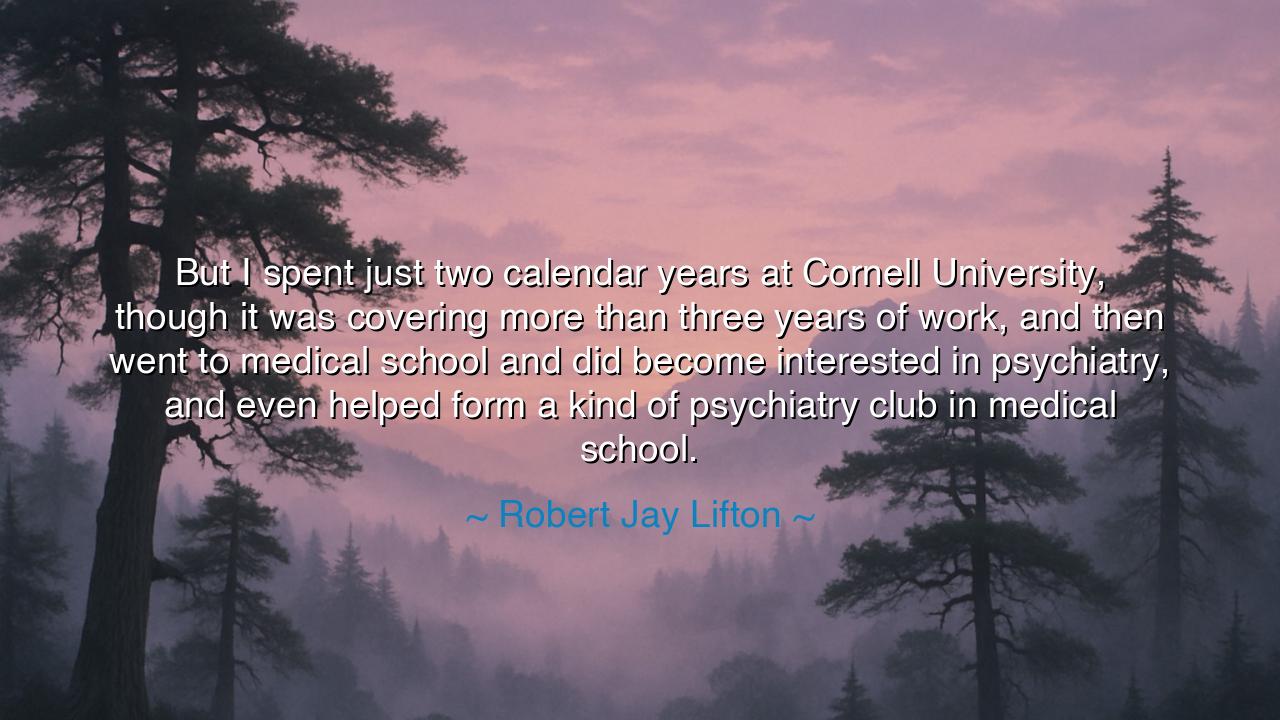
But I spent just two calendar years at Cornell University, though
But I spent just two calendar years at Cornell University, though it was covering more than three years of work, and then went to medical school and did become interested in psychiatry, and even helped form a kind of psychiatry club in medical school.






In the words of Robert Jay Lifton we hear the steady rhythm of perseverance and devotion: “But I spent just two calendar years at Cornell University, though it was covering more than three years of work, and then went to medical school and did become interested in psychiatry, and even helped form a kind of psychiatry club in medical school.” What seems at first a recollection of studies and clubs is, in truth, a testament to the hunger of the human spirit for knowledge, for healing, and for the companionship of shared purpose. It is a declaration that the path of mastery is forged in discipline, curiosity, and fellowship.
The mention of Cornell University recalls more than an institution; it is the soil where seeds of endurance were planted. To complete more than three years of labor in only two years is no idle boast—it is the mark of one who knows the weight of urgency and the sweetness of determination. Such a life reminds us that time itself bends before the will of a steadfast heart. The ancients would say: when a man thirsts for wisdom, he drinks as though from a deep river, never pausing though the current is fierce.
From that river, Lifton journeyed into the halls of medical school, a place where knowledge of the body and the mind is tested like gold in fire. Here, he did not merely walk the prescribed road. He looked deeper, becoming drawn to psychiatry, the art of listening to the unseen, the healing of the soul’s invisible wounds. This turning of interest was not forced upon him by rule or authority, but arose from the calling within—a reminder that true learning is not just about passing through doors of curriculum, but about discovering the doors of one’s own spirit.
And there, among fellow seekers, he did what the wise have always done: he gathered companions and formed a club, a fellowship of shared passion. From the days of Socrates and his circle in Athens, to the guilds of craftsmen in medieval Europe, to the quiet societies of students in modern universities, the power of collective inquiry has always magnified the strength of the individual. Lifton’s psychiatry club was not merely a gathering of students; it was the forging of a sacred bond, a community where curiosity could be nurtured, sharpened, and made into a tool for the healing of humankind.
Consider, as an example, the story of the Bloomsbury Group in early 20th-century England—writers, thinkers, and artists who gathered not because they were commanded to, but because the fire of shared interest burned within them. Though none of them alone might have changed the cultural fabric of their age, together they shaped thought, art, and philosophy in ways that echoed for generations. So it is with Lifton’s circle of psychiatry—what begins as a club may ripple outward, forming movements of understanding that alter how society sees the human mind.
The lesson that descends to us is this: speed of progress is not the measure of greatness, but the depth of engagement is. To work swiftly, yes, but not merely for the sake of finishing—to work deeply, because the heart longs to master what is before it. To discover what truly moves you, and once you have found it, to seek companions in the journey, for no fire burns long in solitude. Great endeavors demand both personal resolve and shared fellowship.
Therefore, let each of you who hears these words take them into practice. Strive with discipline in your studies, as though you have little time, for life itself is fleeting. Listen to the whispers of your soul to find your true calling, even if it leads you from one path to another. And when you find it, do not walk alone—gather others, form your own circle, whether small or large, and let the sparks of many minds ignite a greater flame.
Thus Robert Jay Lifton’s words are not a mere recounting of academic history. They are a quiet hymn to perseverance, to passion, and to fellowship. They teach us that in the weaving of a life, the threads of discipline, discovery, and community must all be bound together. And those who heed this wisdom may find themselves, like him, not only students of knowledge, but healers of souls.






AAdministratorAdministrator
Welcome, honored guests. Please leave a comment, we will respond soon